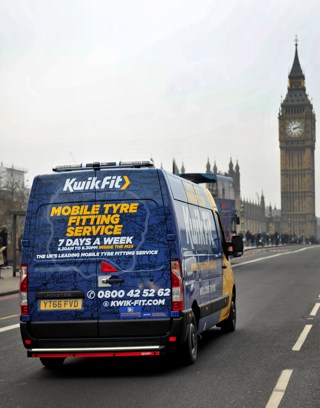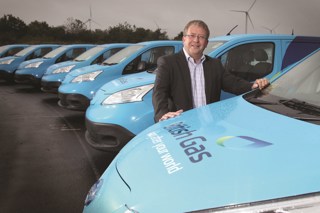British Gas relies on its collaborative partnerships with suppliers to run an effective and efficient fleet, says Steve Winter.
The adage ‘big shoes to fill’ has never rung as true as when applied to the British Gas fleet.
Colin Marriott ran the Centrica-owned operation for 26 years, putting an indelible stamp on processes and strategy, with numerous industry-leading initiatives to improve safety and efficiencies.
Where he led, others followed. For services to fleet, Marriott was inducted into the Fleet News Hall of Fame in 2017.
Big shoes, indeed. However, any suggestion that it’s job done and the fleet can now glide along on a conveyor belt of best practice and water-tight policies is dispelled within moments of meeting the new man in charge.
Steve Winter was brought into the business four years ago as part of Marriott’s succession plan, taking the head of fleet position when the latter retired two years ago.
Winter has extensive knowledge of fleet, starting his career at the coalface as a patrolman with The AA.
After 20 years with the breakdown company, culminating as repair improvement manager, he joined Hitachi Capital Commercial Vehicle Solutions in 2007 as a fleet engineer. His key account? British Gas.
“I moved to Hitachi because I was more interested in fleet management than the breakdown business – it was one of my better decisions,” Winter says.
“It was fulfilling, looking after British Gas and working with Colin offered lots of opportunity to look at innovation. That’s what I’m most keen on.”

Winter applauds the work of his predecessor – “he left the fleet in really good shape” – but believes there are plenty of areas where he can continue to drive efficiencies and savings.
In addition, new regulations, technology and social responsibilities mean the fleet has to continually evolve and adapt.
One of his first decisions was to issue the tender document for British Gas’s leasing partner as its five-year agreement with Hitachi was coming to an end.
Hitachi’s track record “gave it the right to bid for our work”, but there was no special treatment granted to his former employer.
Not surprisingly, given the British Gas fleet of 2,200 cars and 12,000 vans is the UK’s third largest, there was a lot of interest.
The list was trimmed by Winter’s unusual approach to the tender process. His first step is to call all interested suppliers in for a combined meeting.
“I bring all the suppliers together and tell them our vision. Then they tell us whether they want to be part of the tender,” he says. “Some go for it, others decline, which is good because it means we don’t waste each other’s time.”
His fleet team of seven – two account managers, one fleet engineer, a car administrator, one finance, one asset management and another person assigned to the finance team – design the vision and do the presentations as they are responsible for maintaining the supplier relationships.
“My suppliers ‘do’ and the team manages,” says Winter. “We are streamlined because of our collaboration with Hitachi and our other suppliers. It’s an outsourced model that ensures we get maximum value for money.”
The chosen suppliers will continue to come together regularly to discuss innovation, which offers significant benefits to the company.
One outcome of the meetings was an increase in the use of recycled parts and mechanical items for accident repair through salvage/recycling business FAB. It has helped to halve downtime and reduce hire costs by 30% in the past two years.
Hitachi’s proposal for business as usual and fleet management was “class-leading”, according to Winter, and it was duly reappointed as the leasing/fleet management partner a few months ago. However, this was his minimum expectation from the tender.
“It was the innovation they brought into the proposal that made the difference,” he adds.
“We want innovation during the term of the contract and we want service levels to improve so when we get to the end, it’s easy to renew.
"Some suppliers find innovation difficult; others relish it. Price and SLAs (service level agreements) are important, of course, but we are looking at that bit extra.”
His immediate priorities with Hitachi are fleet utilisation, ultra-low emission vehicles, clean air zones and tackling uncertainties.
Only half the fleet is Euro 6-compliant, the minimum required to enter clean air zones without any charges (the rules about vehicle type vary by city), so one project underway is a vehicle replacement programme.
British Gas currently leases its vans for six years but this is under review based on the timing of new product and the likely introduction of electric vehicles (EVs).
It sources model replacement information from manufacturer partners to work into its own replacement cycles.
“We don’t want to be tied into a six-year lease if a lot of new product is coming in the next two-to-three years,” Winter says.
“Hitachi has been creative on our lease lengths. Residual values are important and we have some early termination written into the contracts to allow flexibility.”
Electric is high on the replacement schedule agenda; British Gas has long held an ambition to convert its fleet across. Back in 2013, it made a public commitment to have 10% of its van fleet running on electric by 2017.
That date has since moved to 2020, although the company has introduced 60 electric vans over that time, giving it one of the biggest pure EV fleets in the country.
Winter explains the challenges: “Our engineers take the vans home so we have to have a home-based solution which means charge-points. Out ambition remains to be pure EV, but we need the vehicles with the range and the charging infrastructure.”
Nevertheless, British Gas has racked up one million electric miles over the past five years. The vehicles, all Nissan eNV200s, are coming to the end of their five-year lease and Winter is pleased with their performance.
“We’ve had very little battery degradation, around 10-12%, which was one of the initial concerns,” he says. “We estimated maintenance costs of 60-70% of diesel but it’s a lot less than that, which benefits the total cost of ownership (TCO).
“Driver acceptance is good; it relieves stress, they are automatic and quiet. And, from an operational point of view, we have had very few breakdowns, so uptime is good.”
The experience has persuaded him to switch direct from diesel to electric for vans where possible, leapfrogging plug-in vehicles. “I don’t believe they work from a TCO point of view,” Winter says.
He is similarly unimpressed by petrol after a trial failed to produce fuel consumption savings. Driver feedback was also negative.
“EVs are starting to slot into our working practices. But they have to meet our requirements, not the other way round. We have no compromise on specification, safety and capacity,” says Winter.
The flexibility on lease lengths negotiated with Hitachi isn’t simply to facilitate the uptake of EVs as they come to market. British Gas also has safety in mind; it is keen for its vehicles to adopt the latest technology.
Active braking systems are specified as standard after Winter proved the return on investment case with a trial on 400 Seat Leons. Rear-end collisions reduced by 20%.
Safety and collision management is linked closely to downtime management, which is a key performance indicator (KPI) for the fleet. Hitachi Capital Vehicle Solutions managing director Jon Lawes calls it “class-leading” among its customers.
Telematics plays a crucial role with the data combined with shift patterns and distance of use to ensure planned maintenance is scheduled on engineers’ rest days. Repairers collect and deliver the vehicle from the engineer’s house. Consequently, downtime is less than half a day per year.
Unscheduled maintenance is also kept to a minimum, partly through investing in reliable vehicles under the company’s TCO matrix.
Each vehicle is matched to a repairer, managed by Hitachi, so they can plan for MOTs and servicing. Such close collaboration also means that, if a vehicle breaks down, British Gas gets priority attention.
Downtime resulted in costly vehicle hire which affects engineer productivity as the vans do not meet British Gas specification. The company has partially offset this by holding a fleet of surplus vehicles, but they are kept centrally which is inefficient when the fleet is spread nationally.
Winter’s target is to hold 3% of the fleet as surplus – it’s currently too big – or, put another way, to achieve 97% utilisation. British Gas is working with Hitachi and its suppliers to find a way to hold stock regionally.
“I don’t want 3% of my fleet sitting in our car park; I want it to be used to replace our hires,” Winter says. “That’s why we need to put the vehicles into strategic locations. Hitachi will manage this as part of the contract.”
Utilisation will be further enhanced by a vehicle usage and specification project. Winter suspects he has too many variances and hopes to be able to rationalise the 12 specifications to two vehicle types – small and medium vans – with four or five specs.
The project will be tied into the next tender for van partners. Its current suppliers, Ford and Volkswagen, are in contract extension while Winter goes through his tried-and-tested process of bringing prospective suppliers together.
The vision he is sharing with them focuses on British Gas’s electric vehicle roadmap. The tender will require insight into future models, recyclable racking, safety equipment and turnkey solutions. Also key are the practical user requirements such as load space and roof capacity.
In addition to bringing the right vehicles onto fleet, Winter is also considering the growing challenges of urban transport and has a number of trials underway for last-mile distribution solutions.
“Within the next year, we will be looking at parts supply and parts racking on our vans when we have completed our trials,” he says. “We are also looking at electric bikes, but one problem is we have to carry step ladders and lots of equipment to ensure a first-time fix.
“A lot of it is about having the right vehicle which cuts down on movements. I can’t see us having an airfield of drones, but there will be more supply chain logistics. And while our contracts will change, the innovation will still need to be there.”

Cars are leased but other options are under consideration
British Gas has a company car fleet of 2,200 vehicles, a 50-50 mix of essential users and perk cars, with another 2,000 grey fleet drivers.
It leases its cars but is evaluating other options, such as employee car ownership schemes.
No decisions will be taking until the Government clarifies future taxation thresholds, although it’s likely that British Gas will opt for a blended approach.
The new fuel testing regime WLTP has caused confusion but the company has been agile with its car policy which offers five badges: Audi, BMW, Mercedes-Benz, Seat and Volvo. Steve Winter has seen a shift in demand, based on availability.
“Volvo declared its figures early and they have picked up orders as a result,” he says. “We have left it to our drivers to make the choice while certain models were not available; they have found alternatives. We also allowed them to cancel orders if necessary.”
British Gas decided to be more flexible with its essential user drivers, who previously were restricted to Seat.
“We are now giving them the opportunity to go into the full car scheme to open up their choice,” Winter says.
“It’s good for staff retention and the manufacturers have worked hard to get their vehicles within our allowance bands.”





















Login to comment
Comments
No comments have been made yet.